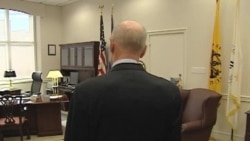WASHINGTON —
The U.S. government has a system in place that oversees department and agency actions, and also watches over private sector companies that are contracted to the government. The goal is to fight corruption, and make government programs more efficient and effective. The role played by Inspectors General is pivotal.
This man watches over every penny of the more than $940 billion budgeted to the U.S. government’s massive Department of Health and Human Services, also known as HHS. His office is within HHS, but ultimately, he works for Congress - and for the American people.
He’s Daniel Levinson, the HHS Inspector General. He and his IG counterparts in every U.S. government department and agency search for corruption, and also scrutinize how programs for the public, as well as internal operations, are being run.
“We audit the money that comes through the department. We investigate any possible wrongdoing as a result of looking at those figures, to see whether there might be criminal activity involved, and if there is, to prosecute those who would be engaged in that activity. And thirdly, we look to see whether we can improve the programs as they operate, and inform the wider health care provider community about how to provide those services better,” said Levinson
With billions of U.S. tax dollars spent on health care and programs, the potential for fraud and corruption is huge. Levinson reports that over the past five years, his audits and investigations have resulted in nearly 3,800 criminal convictions, nearly 2,000 civil settlements, and recovering more than $23 billion.
Inspectors General are appointed by the president, and report to Congress about their department’s or agency’s activities. They also inform the department secretaries or agency heads in the areas in which they work, though they are not subordinate to them.
Maintaining that autonomy is vital according to the government watchdog group Project On Government Oversight's Michael Smallberg. "Ideally, we think there should be an adversarial relationship between the inspector general and the agency head. Not antagonistic, not openly confrontational, but there should be a healthy distance between the two.”
A vivid example of that separation came when Congress, in response to the 2008 financial crisis, created the Troubled Asset Relief Program - or TARP. The IG overseeing TARP, Neil Barofsky, publicly criticized Treasury Secretary Tim Geithner, saying the Secretary’s implementation of the program favored Wall Street instead of the public.
“The only way that TARP got passed, the only way it got the votes necessary in Congress to become law, was promises by the Treasury Department and the President that this would be a program that would not just help the big banks, but also help those struggling homeowners. When President Barack Obama announced what he was going to do, he said up to four million people would stay in their homes because of this program. And, that was just an absolute failure.”
While the TARP program eventually provided some homeowner assistance, Barofsky says it has never fulfilled its promises to Congress. His battles with Geithner prompted him to resign in March 2011, but the position itself continues - with a new inspector general.
This man watches over every penny of the more than $940 billion budgeted to the U.S. government’s massive Department of Health and Human Services, also known as HHS. His office is within HHS, but ultimately, he works for Congress - and for the American people.
He’s Daniel Levinson, the HHS Inspector General. He and his IG counterparts in every U.S. government department and agency search for corruption, and also scrutinize how programs for the public, as well as internal operations, are being run.
“We audit the money that comes through the department. We investigate any possible wrongdoing as a result of looking at those figures, to see whether there might be criminal activity involved, and if there is, to prosecute those who would be engaged in that activity. And thirdly, we look to see whether we can improve the programs as they operate, and inform the wider health care provider community about how to provide those services better,” said Levinson
With billions of U.S. tax dollars spent on health care and programs, the potential for fraud and corruption is huge. Levinson reports that over the past five years, his audits and investigations have resulted in nearly 3,800 criminal convictions, nearly 2,000 civil settlements, and recovering more than $23 billion.
Inspectors General are appointed by the president, and report to Congress about their department’s or agency’s activities. They also inform the department secretaries or agency heads in the areas in which they work, though they are not subordinate to them.
Maintaining that autonomy is vital according to the government watchdog group Project On Government Oversight's Michael Smallberg. "Ideally, we think there should be an adversarial relationship between the inspector general and the agency head. Not antagonistic, not openly confrontational, but there should be a healthy distance between the two.”
A vivid example of that separation came when Congress, in response to the 2008 financial crisis, created the Troubled Asset Relief Program - or TARP. The IG overseeing TARP, Neil Barofsky, publicly criticized Treasury Secretary Tim Geithner, saying the Secretary’s implementation of the program favored Wall Street instead of the public.
“The only way that TARP got passed, the only way it got the votes necessary in Congress to become law, was promises by the Treasury Department and the President that this would be a program that would not just help the big banks, but also help those struggling homeowners. When President Barack Obama announced what he was going to do, he said up to four million people would stay in their homes because of this program. And, that was just an absolute failure.”
While the TARP program eventually provided some homeowner assistance, Barofsky says it has never fulfilled its promises to Congress. His battles with Geithner prompted him to resign in March 2011, but the position itself continues - with a new inspector general.






